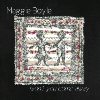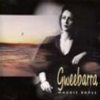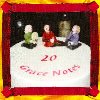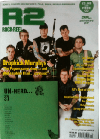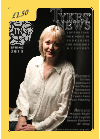Reviews
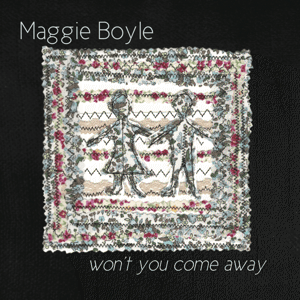
Won’t You Come Away
Wild Goose, WGS 390 CD, 2012
". . . divine trad. Irish singer and flautist." TIME OUT
CD
Won’t You Come Away is the name of Maggie Boyle’s third solo album. It’s a statement not a question, captured evocatively on the cover by a patchwork square with a man and a woman holding hands. The listener really has no choice, it’s an invitation that can’t be refused.
Maggie Boyle draws us in using the sensitive power of her voice. She is supported admirably by Paul Downes on guitar, mandocello and mandolin; Jon Boden on fiddle; Dave McKeown on clarinets; Steve Tilston on arpeggione; and Dave Wood on Arnold Resonator guitar. Maggie herself plays flute, whistles and harmonium.
Maggie says of this album, ’It’s special to me. I have included traditional songs from my childhood, extending to beautiful, newly written songs by friends and relations, and brand new tunes.’ All the songs, whether new or old, are distinctive and fresh. The variety of styles and types of song makeWon’t You Come Away a pleasingly varied listening experience.
She opens with Moorlough Mary, a pleasant gentle traditional song, nicely offset by Paul Downes’ tune The Streams of Bawdeen. Another familiar song follows: The Trees They Do Grow High comes via Peter Bellamy’s interpretation. Jon Boden’s querulous fiddle provides a haunting backdrop.
Dawning is a modern song set to music to which the polska can be danced. It is a light lively tune with uplifting lyrics by Maggie’s friend Frances Watt.
Once in a While, by Steve Ashley, brings back memories of early Mary Black songs. This is partly the arrangement which starts with Maggie singing unaccompanied. The guitar and then the woodwind come in just in time for the chorus.
Other modern songs in this vein include the Anglo-Irish Nick Burbridge’s Old Man’s Retreat, a vehement and courageous lyric, and Christmas in No Man’s Land, a song about the World War I 1914 Christmas truce by Mick Ryan, a day when the Germans, French and British spontaneously met up at a game of football.
Donal Og, a traditional song, is a particular treat. Maggie tells how this song came to her from her mentor, Oliver Mulligan of County Monaghan. ’About 45 years ago, my Dad brought Oliver to our home in Battersea - to teach me some serious traditional singing. I did my homework, it was no chore; I adore this song.’ She sings it simply with true emotion, and it is one of the triumphs of the album, the song of a spurned woman.
’You took what’s before me and what’s behind me Took east and west when you wouldn’t mind me Sun, moon and stars from my life you’ve taken And God as well if I’m not mistaken’
In contrast, the lively acoustic song Liza and Henry follows. It was written by Maggie’s son who has a background in ska and reggae, and she sings it with earnest vigour.
The CD also includes three tunes with haunting flute joined by guitar and whistles: Lament for John Doherty/Betty-Sue Southall/Paddy Boyle’s Highland.
Maggie sings unaccompanied another fine traditional song given to her by Oliver Mulligan, The Green Linnet. This shows her ability to tell a story simply through the power of her voice, not reliant on anything else to add drama or nuance to the tale.
On Yonder Hill is a hunting song about a hare that comes from Geordie Hanna. Maggie’s version is simple and disarming, followed by a new tune Boxty Bailey.
The final song Linden Lea was set to music by Ralph Vaughan Williams, and is a song that Maggie ’will never tire of singing’.
Won’t You Come Away takes the listener to a world stripped back to bare essentials, showing, as does all the best folk music, that through the perfection of plain playing true to the spirit of the music, a world can be created with nothing extraneous. It’s a world that feeds and nourishes the soul.
the bright young folk review - Karin Horowitz
This CD was recorded by the performers in several locations, primarily at WildGoose Studios, and cleverly stitched together to make one of the most beautiful and intricate recordings I have heard in a long time. Maggie Boyle ( singer and flautist) has been a regular visitor to folk clubs in East Anglia and will be known to many of our readers. Paul Downes is well known for his collaborations with some of the greatest singers and performers including Mick Ryan ( a song by him is track 11). Jon Boden on fiddle is one of the movers and shakers of the folk world. Steve Tilston, is here playing an arpeggione (a fretted cello-like instrument), Dave Wood accompanies on resonator guitar and Dave McKeown on woodwind plus melodica & wind synth.
There are several tracks of traditional songs , not surprisingly considering Maggie's introduction to singing from the illustrious Oliver Mulligan. Donal Og and the Green Linnet are directly from Oliver and indirectly On Yonder Hill from the singing of Geordie Hanna. Maggie's delicate and intelligent vocal decoration enhances the ballads, pointing their tragic and monumental structure. Just listen to the Green Linnet to hear how such a majestic ballad should be sung. It is no wonder these songs have lasted for generations.
Many of the other tracks have friend and family connections - The Lament for John Doherty, part of the sole purely instrumental track was written by Maggie's aunt Margaret McGinley,the second tune is Maggie's own composition and the third written for her father, Paddy by Charlie Lennon. Her son Joe's song Liza & Henry is a modern and inventive take on the Hole in my Bucket.
Of all the non-traditional tracks my favourite is Linden Lea (music by R Vaughan Williams) which I have heard murdered all too frequently by so-called “trained” singers. I am sure that RVW would have loved this version sung by Maggie's sweet voice in such a relaxed and natural style.
Maggie shows, in this album, that she is equally at home with recently written songs and tunes as she is a pre-eminent exponent of traditional song. It is refreshing that she is not averse to accompaniment for such stately songs as Donal Og and Moorlough Mary. With such musicians as collaborators Maggie could hardly go wrong, except in the minds of the most dedicated purists.
If I didn't have this CD already I would go out and buy it!
Mary Humphreys ~ Mardles Magazine
Listening to a new album from Maggie Boyle is rather like dipping into a box of chocolates blindfolded to find another delight. To carry the simile slightly too far, Won't You Come Away is a bumper selection.
Maggie is supported in the main by Paul Downes with guest appearances by Jon Boden, Dave McKeown, Steve Tilston and Dave Wood, and the production, as usual with DougBailey, is unfussy and places the music at the forefront. It's Maggie's eclectic choice of material that is the real delight, however. Here are traditional songs, mostly Irish, with 'Donal Og' and 'The Green Linnet'
standing out.
There are old favourites like ‘Linden Lea' and Steve Ashley's 'Once ln A While' and new songs like 'Liza & Henry', a modern take on 'There's A Hole In My Bucket' written by Maggie's son Joe. Most extraordinary is Nick Burbridge's 'Old Man's Retreat', a song of great bitterness and pain.
For me, there is one nougat in the chocolate box [I like nougat; I think you meant Turkish delight: confectionary Ed] and that is 'The Spinning Wheel'. The fact that Foster & Allen recorded it should be warning enough and it's a dreadful piece of Victorian sentimentality. Not enough to damn the whole album, though.
Dai Jeffries - R2 rock’n’reel, July 2012
Deep-rooted, hearty folk song - 8/10
Boyle has recorded more than a dozen albums in collaboration with the likes of John Renbourn and Steve Tilston but averages only one solo album per decade since 1987's Reaching Out. She draws regularly from Irish songs, many learnt form Oliver Mulligan of County Monaghan, who was part of the London-Irish community she grew up in. Contemporary sources include the unsung Steve Ashley's "Once in a While", where Boyle's divinely pure voice is enhanced by some exquisite clarinet. Elsewhere, Paul Downes' Planxty-like guitar, Boyle's flute and the ubiquitous Jon Boden's fiddle combine to create the perfect setting for Boyle's criminally overlooked voice.
MICK HOUGHTON - Uncut, August 2012
There are three elements among the songs that Maggie presents here. Her London Irish background is reflected in style and repertoire: the great Oliver Mulligan is quoted as a great influence. Then there are English traditional songs from her contact with the folk revival, and modern songs showing the influence of the tradition. She has that important knack of choosing really fine songs and, more importantly, songs that demonstrate the excellence of her singing voice.
Outstanding is her commanding interpretation of the difficult Irish Napoleonic ‘The Green Linnet’, the only unaccompanied song. This is not to say that the singing elsewhere is not delightful nor that she is not well served by her accompanists, for she is. Jon Boden provides some sombre fiddle and the renowned and versatile multi instrumentalist Dave McKeown, enhances with his contribution. However, it is Paul Downes, Maggie’s current touring partner, present on every accompanied item, who deserves the most praise for the sensitivity of his guitar, mandolin and mandocello accompaniments.
Of the Irish songs, two more coming through Oliver, 'Donal Og’ and ‘On Yonder Hill' are both well arranged to enhance lovely singing. Turning to the English songs. it is not surprising to hear ‘Linden Lea' which has always been prominent in her live performances while the solemnity of the voice and accompaniment on ‘The Trees They Do Grow High' suits it well. All five modern songs show great merit; she finds great emotional depth in the way she sings Steve Ashley's 'Once In a While' and it is good to see other singers taking up Nick Burbridge's well- structured songs: ‘Old Man’s Retreat' is the one that is heard here. A final mention is reserved for ‘Liza and Henry', written by Maggie‘s son, Joe; hardly surprising that he can turn out a good song with talented songwriters on both sides of his family.
Vic Smith - ENGLISH DANCE & SONG magazine (Autumn 2012)
Maggie is rightly acknowledged as one of this country’s premier traditional singers, a song- carrier in the true sense who continues the tradition of music and story telling passed down through her London-Irish heritage. Although Maggie's been active on the scene for close on 40 years, and has contributed to many other artists' CDs in addition to collaborations with Steve Tilston and John Renbourn (and of course the wonderful Grace Notes), Won't You Come Away is only her third solo album (following 1987's Reaching Out and 1998's Gweebarra).
And yet, considering that Maggie's is one of those voices that can reduce a room to silence with an unaccompanied song (as l've been privileged to witness at sessions hereabouts), it's sad that there’s only one a cappella track on this disc - a spellbinding take on The Green Linnet. Having got that one disappointment out of the way, though, I should stress that Maggie's aptitude for engaging thoroughly intuitive supporting musicians is as noticeable as ever, and I wouldn’t for one moment under play their contributions. The sensitive and highly responsive nature of the accompaniment is arguably nowhere better demonstrated than on The Trees They Do Grow High. Central to the texture is the unflinchingly expert guitar (/mandolin/mandocello) of Paul Downes, arrangements often further fleshed out by Maggie's own flute, whistle or harmonium and Jon Boden's fiddle, with (more occasionally) Dave Wood's resonator guitar, Steve Tilston's arpeggione and Dave McKeown's clarinets, melodica or wind synth.
As far as repertoire’s concerned, there’s a certain degree of irony in that, for all Maggie's reputation as an exceptional exponent of traditional song, several of the disc's highlights turn out to be her magical interpretations of some very special contemporary compositions. A crowning jewel is Frances Watt’s Dawning, a joyous, ingeniously polska-skippery test of Maggie's proven vocal dexterity, whereas on Nick Burbridge’s Old Man’s Retreat, Maggie responds equally keenly to the song’s unique combination of serious intensity and lyrical beauty. Other successes include Steve Ashley’s Once In A While and the delightful Liza &Henry (penned by Joe Tilston, Maggie's son) - for which she supplies her own gorgeous harmonies - and a fresh minted, simple new take on Linden Lea (which Maggie first recorded, in a more fussy arrangement, on her 1996 duo album with Steve, All Under The Sun). There's also a spirited take on On Yonder Hill (from the singing of Geordie Hanna), and I don’t think l’ve heard a more beguiling account of The Spinning Wheel - delicately lilting and authoritatively considered, with the abundant expressive sincerity which distinguishes Maggie's performances throughout this lovely disc.
David Kidman - fRoots, July 2012
lt's odd to think that this is only Maggie Boyle`s third solo album in almost 25 years, as she’s been making music for most of her life, having been brought up in the energetic and colourful ‘6Os London-Irish community, where learning songs and music from her father Paddy whose roots were in Donegal, was you’d imagine, a way of life.
This album comes across as a labour of love for not only does Maggie credit her Dad as mentor, she gives due acknowledgment to Oliver Mulligan, another respected singer and a regular at the now-demolished ‘Favourite’ in Holloway, originally from Co. Monaghan -and singing still! Her collaborations with many and assorted singers and projects over the years have overshadowed her singular talents so it`s good to have this recording running around on its own two feet and a delightful listening experience it proves. Sounding utterly in her element, Boyle is on excellent form throughout, from the opening, lyrical Moorlough Mary to the elegiac Linden Lea which takes us out 12 tracks later.
An affection and respect for both songs and sources infuses the whole proceedings - this is purposeful music with lovingly chosen ingredients, not flavourless additives that some might throw into the pot. Spiced by variously, Jon Boden, Paul Downes and Steve Tilston to name but three, the mix is marinated in Doug Baileys empathic production.
Though regarded primarily as a singer of traditional material, Maggie can essay a spare, wistful Once In A While written by the consummate Steve Ashley, and by way of contrast Delia Murphy`s timeless Spinning Wheel with an easy grace.
If you seek elegant, reflective yet compelling listening, congratulations - you arrived at the appropriate review!
Clive Pownceby - LIVING TRADITION, july-sept 2012
Perhaps best known in recent years as part of the female vocal harmony trio Grace Notes, Maggie doesn't seem to get as many opportunities these days to showcase her considerable solo talents. Happily, Won't You Come Away gives her a superb platform for exploring a range of enchanting songs. Maggie delves into her Irish heritage with classic songs like The Spinning Wheel, Donal Og and Moorlough Mary. Her vocal style is well suited to the Irish material, with breaks and ornamentation that seem influenced by previous generations of source singers without being so pronounced as to distract from the loveliness of the songs. She also handles very capably some classic English songs such as the ineffably beautiful Linden Lea, and even has a bit of a bluesy rock-out on her son Joe's Liza and Henry. Vocally the album is very self assured with a stylistic strength and depth which may have influenced some of the current generation of young female singers who eschew breathy prettiness for passion. Accompaniment is stellar, with the likes of John Boden, Steve Tilston and Paul Downes lending classy arrangements.
Joan Crump - Propaganda
The first surprise is that this is only the third solo album from Maggie, despite the fact that she’s contributed to no fewer than 14CDs over many years with the likes of Steve Tilston and John Renbourn and is a firm and much respected fixture in the UK folk world. Reared in the London-lrish community back in the 1960s, she’s obviously steeped in both the Irish and British traditions. She performed most of the music used in the film Patriot Games and Legends of the FalI also remember her fine flute playing on Steve Tilston's Swans at Coole and, l believe, on some of the earlier John Renbourn offerings. Anyhow, here she [is] again in splendid voice, still with her flute as well as a harmonium humming in the background.
The album is a mix of traditional and contemporary songs. Some are familiar territory - Linden Lea,The Green Linnet, The Trees They Do Grow High -while others, especially the tunes, are a pleasant surprise. There's even a tune by a certain M. BoyIe slipped inside a set of three. For the most part, the songs and tunes are played with only minimal accompaniment or none at all. l’m pleased to see Mick Ryan's Christmas in No Man’s Land given a first airing. Here, as elsewhere on the recording,we hear the sensitive guitar playing of Paul Downes. lt is followed by a lesser known traditional song, On Yonder Hill which features Dave McKeown playing a wind synth. This prompted me to look into what this instrument is- a fascinating surf through You Tube and beyond!
She finishes with Linden Lea with the well know Vaughan Williams air, and a reminder of just how exquisite these 19th century lyrics by William Barnes are. And so to the verdict: a definite thumbs up for this album, both for the choice of material and for the execution. And, perhaps above all, for the undiminished vocal talents of Maggie Boyle whose depth of experience is firmly stamped on all that she touches.
Jon Bennett - Shire Folk, Issue 119 July-August
You wait ages for a Maggie Boyle and then two come along together. First Grace Notes’ 20 and then this excellent solo album. First of all, one should define “solo”: Maggie features on faultless vocals, sublime flute playing and, surprisingly, harmonium. She is joined on this occasion (for she is one who can always rally an impressive team of co-workers in the factory of melody) by Paul Downes, Jon Boden, Steve Tilston on arpeggione, reeds from Dave McKeown and the resonator guitar of Dave Wood, who adds a bluesy feel to many tracks.
Since this might seem a surprising statement to many of Maggie’s admirer, let’s start with one such bluesy track: Liza & Henry is a witty rewrite of There’s A Hole In My Bucket: it songs like the lost blues behind the singalong folk ditty. It is in fact, a new composition by Joe Tilston, Maggie’s son. This is not the only familiar connection on the album – sleeve by daughter, artwork by husband and, best of all, Betty Sue, a rare M. Boyle original, a tune “which came to me while dancing with my newborn grand-daughter”; it is framed by an air written by her aunt and a fling, dedicated to her father.
One of the delights of hearing Maggie sing – either in person or on disc – is the freshness which she brings to familiar, even hackneyed material. Some of the songs here will be very well-known to most of you – Steve Ashley’s Once In A While, Donal Og, Linden Lea, The Spinning Wheel andThe Green Linnet (performed acapella for a captivating five and a half minutes: Maggie brings them to live so that they full of the fresh surprise of the half remembered.
Maggie’s keen ear for a good song is shown by the less familiar material – Christmas In No Man’s Land, Old Man’s Retreat and the wonderful Dawning, which has new words by Frances Watt to a traditional eastern European tune. The last track is a potential classic - Maggie may be the first to record it, but I am sure she will not be the last.
The album’s title recalls a release by Peter Bellamy, who is represented on the disc by a moving version of his recording of The Trees They Do Grow High.
The whole album is a fine achievement by a truly great singer.
Nigel Schofield TYKES NEWS
Another album from the outstanding London Irish singer; this one shows her repertoire reflecting her Irish parentage and her English birth.
Growing up in a metropolitan community that thrived on all aspects of its Celtic heritage, it is not surprising that Maggie was Influenced by Oliver Mulligan with "Donal Og", "The Green Linnet" and "On Yonder Hill" all being learned from him. She includes some memorable modern songs from Steve Ashley, Mick Ryan, her son Joe and it is good to hear "Old Man's Retreat" from local songwriter Nick Burbridge included.
Maggie is well served by her accompanists here and Jon Boden's spare, sombre fiddle is really notable but most praise should be saved for the contribution of Paul Downes. As well as being Maggie's touring partner. Paul is present on every track except one - her remarkable take on "The Green Linnet" - on mandocello and (mainly) guitar and he shows great skill and sensitivity throughout. Surely, there was a case for the album being under their joint names?
Vic Smith - Folk Diary
Maggie Boyle’s musical roots were nourished in the musically vibrant community of the 1960s and 1970s. Coming therefore from a culture and tradition that has produced such magnificent singers as Margaret Barry, Freddy McKay, Oliver Mulligan and many, many more, Maggie has much to live up to. This she does in no uncertain manner with this album which is of exceptional quality.
This is Maggie's 3rd solo album and her 17th if you include collaborations and she is has reached a pinnacle in terms of performance. Allied to her beautiful voice is the interpretation of a mature singer with great respect for the tradition, of which she is a standard bearer.
This album is a mix of carefully chosen traditional and contemporary songs some of them written by friends and one by son Joe Tilston, This latter is an amusing take on the old children's song There’s a Hole in the Bucket. My favourite though from the contemporary songs is Mick Ryan’s superb Christmas in No Man's Land. Maggie’s rendition is as poignant as it gets.
lt‘s actually quite difficult for me to pick out particular songs from this album because the standard throughout is first class. But to mention a couple ~ the first song, Moorlough Mary, which I have never heard before, is accompanied by a lovely guitar solo from Paul Downes called The Streams of Bawden and this sets the reflective and melodic tone for the whole set. Maggie learnt two of the traditional songs Donal Og and The Green Linnet from Oliver Mulligan who of course is still a much loved and respected singer on the London folk scene. Maggie’s treatment is delightful and these were highlights for me.
As if her lovely voice wasn’t enough Maggie has also recruited a number of high quality musicians to accompany and add to this album. Great acoustic guitarist Paul Downes, better known for his fine work with Mick Ryan, virtuoso guitarist and former partner Steve Tilston, Jon Boden and clarinettist Dave McKeown provide the ideal backdrop to Maggie's fine singing.
As you’ve probably gathered I really rate this album and can recommend it to you.
Mike Norris FOLK LONDON June-July 2012
This highly-regarded performers distinctive voice and flute have graced a string of excellent folk CDs since she made her debut in1987 with ‘Reaching Out', although the vast majority of these recordings have been collaborations with luminaries such as Steve Tilston and John Renbourn. 'Won't You Come Away' is only the third solo set that Maggie has recorded during the past two-and-a-half decades, and this splendidly eclectic offering showcases compelling trad-ballads such as 'The Green Linnet' alongside Vaughan Williams' 'Linden Lea' and some fine vehicles for her instrumental prowess led by ‘Lament for John Doherty and 'Paddy Boyle's Highland'.
Kevin Bryan
Gweebarra
"Maggie Boyle tackles largely traditional song with a full-blooded ardour that'll come as a shock to those weaned on the flaky New Age nonsense sold to us as Celtic music through most of the '90s. . .Boyle gets right inside the songs in the uncompromising manner of the best storytellers." Colin Irwin, FOLK ROOTS
"....vocals that should be protected like crown jewels." Pete Fyfe, ROCK 'N' REEL
"..on Gweebarra her exquisite singing shows maturity and sophistication giving what is, without doubt, her best recording ever. . . . a sheer joy."
Mel Howley, LIVING TRADITION
"A cracking album."
Mike Harding, FOLK ON TWO
Ship of Fools
". . . it's the vocal contribution of Maggie Boyle that marks this album as a first rate traditional folk-meets-digital-technology exercise"
Q MAGAZINE
". . . Amazing. . as the audience left there was only stunned silent admiration."
EVENT MAGAZINE
". . . displays the beautiful two part vocal arrangements of Tilston and Boyle."
FRETS MAGAZINE USA
Sergeant Early's Dream
". . . I must mention Maggie Boyle, whose hauntingly beautiful voice is not easily forgotten and whose renditions of Eighteen Years Old and Black is the Colour of My True Love's Hair did far more than just enhance the dancing or provide storylines for it."
DANCE THEATRE JOURNAL.
". . . This multi-emotional work is given impact thanks to The Chieftains with singer Maggie Boyle. The renowned Irish folk musicians play the songs on-stage in a fluid, highly atmospheric style."
CINCINNATI POST.
Of Moor and Mesa
• "Steve Tilston and Maggie Boyle's first album together is quietly and utterly seductive...superbly crafted"
fROOTS
• "Of Moor And Mesa is a folk gem which grows in brilliance on subsequent plays, one which will tantalise for months to come...the combination of original and traditional material strikes a fine balance that pushes this LP towards deification as a classic record. It shines brighter than the majority of records currently vying for your attention"
FOLK ON TAP
• "...a masterpiece - there's no other word for this. Steve Tilston is the finest songwriter England has ever produced. Here is his talent at its peak. He has absorbed the best of the ballad tradition into his writing, & the results are staggering ...Maggie Boyle has a voice the angels would kill for, & her vocal contributions are first class"
ROCK'N'REEL
• "Steve Tilston and Maggie Boyle are one of the most compelling acts in British and Irish folk music today...his guitar and arpeggione are as lovely here as they were on his solo record Swans at Coole, and that's saying a great deal"
DIRTY LINEN
• "Tilston is a powerful, sensitive songwriter and skilled guitarist. Boyle's expressive vocals dominate the Patriot Games (Paramount Pictures, 1992) film soundtrack, and the couple's new album, Of Moor and Mesa, is an example of a promise fulfilled" critic's choice, WEEKEND TELEGRAPH
• "If there's such a thing as a perfect album, this is it !"
BARBARY POST (AUSTRALIA)
All Under the Sun
"Boyle's choice of traditional songs is another step up, with the epic "Fair Annie" a match for anything recorded by the great Anne Briggs."
Colin Harper,Q Magazine
Live Reviews
Maggie's voice and passionate commitment to communication shone through the erstwhile shackles of the idiom, and penetrated to assuage those dark recesses of pain that we might have thought unfathomable.”
“A musician of supreme charm and elegance.”
FOLK ON THE MOOR
". . . exquisite flute playing with beautiful voice and lyrics."
fROOTS review of Cambridge Festival
I've known for some time both Paul Downes, mainly through his work with Mick Ryan, and Maggie Boyle, through her work with Grace Notes, but it wasn't until we shared a concert at Whitby Folk Week last year that I saw them for the first time as a duo. They were very impressive together so noticing that they were on at the Bothy Folk Club in Southport I took the opportunity to go and enjoy their music once more.
I suppose the date of performance is significant given Maggie's Irish ancestry but, thankfully, they made a point of not doing an Irish night although, of course, a number of lovely Irish songs were featured.
The careful mix of songs and tunes and the inventive arrangements made for two interesting sets which illustrated their great skills vocally and instrumentally. They included many seldom heard but interesting songs too. Singable choruses helped to engage the audience throughout as well.
Maggie's background knowledge of the songs, a feature often sadly ignored by many artistes, added to the enjoyment of them. Also the occasional solo by each of them added to the variety. Maggie's voice to me is different from but very reminiscent of the great Frankie Armstrong.
Paul sang a super American song called 'Boatman's Cure' written by Georgie Ward which was especially memorable. Joe Tilston's (Maggie's son) song based on 'Hole in My Bucket' called 'Lisa & Henry' was very entertaining but an outstanding anti-conflict/war song by Nick Burbridge called 'Old Man's Retreat' was a very different matter. The imaginative writing in this song was stunning and beautifully sung by Maggie.
'Linden Lea' is one of my favourite songs and is brilliantly performed by these two so I was glad they included it in their repertoire. It also provided an English antidote to all the Irish material.
Paul's musicianship (even when he played banjo!) and sharp humour and Maggie's fine singing and flute playing made for a great night illustrating their polished professionalism.
Their encore song 'Camden Town' (Maggie was born in London) written by her elder brother and was good song to finish on with another singable chorus.
It was a real treat to see them both again in a club setting so, if they are appearing in your locality, I can highly recommend that you go and see them.
Live Review
Maggie Boyle and Paul Downes at the Bothy Folk Club
17th March 2013
Derek Gifford





